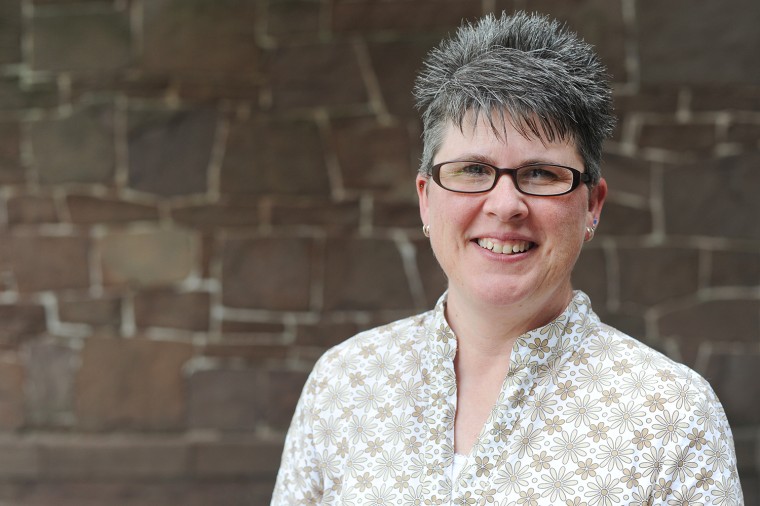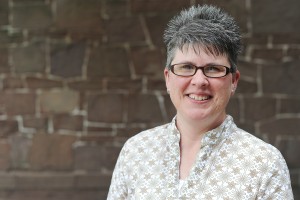Debbie Colucci is Equity Compliance Director, Deputy Title IX Coordinator


In this issue of The Wesleyan Connection, we talk to Debbie Colucci, who came to Wesleyan in June 2014 as the new equity compliance director and deputy Title IX coordinator.
Q: Welcome to Wesleyan, Debbie! Please briefly fill us in on your professional and personal background. What makes you uniquely qualified to take on this position?
A: Personally, I have always been committed to creating an inclusive and supportive environment that addresses the needs of a diverse population and provides a rewarding experience for all individuals. I have a master’s degree in college student personnel and higher education administration and, while my career in higher education began on a traditional student affairs/residence life path, my more recent experiences have afforded me the opportunity to develop a unique skill-set related to equity initiatives. After spending many years developing and presenting programs related to inclusion, I left residence life and became the assistant project director for the Anti-Defamation League’s A WORLD OF DIFFERENCE® Institute. The emphasis of that program is on communication, understanding, respect for differences, and contribution. That is when my career, and my understanding of my role in the world, shifted.
Q: I understand you’ve worked at Wesleyan before. When was your prior period of employment, and what did you do for the University then? Are you surprised to find yourself back here?
A: That’s true. I came to Wesleyan in 1997 as the assistant director of residential life and when I left in 2000 I headed to the A WORLD OF DIFFERENCE® Institute. I don’t know that I’m surprised to be back; but I’m certainly not not-surprised! There is an atmosphere at Wesleyan that is hard to resist!
Q: You’ve joined the University at a time of rapid change in its efforts toward equity and inclusion. Please bring us up to speed on some of the recent changes in your office.
A: I’ve only been here thirteen days at this point so I’m not sure I can accurately capture all the recent changes. However, I think perhaps the biggest change is the creation of the Equity and Inclusion team — Antonio [Farias, vice president for equity and inclusion, Title IX officer] has put together a small but mighty department with a passion for making a difference.
Q: What will be your main areas of focus during your first year here?
A: I’m essentially responsible for working with the team to ensure that Wesleyan University policies and practices comply with Title IX, Title VII and other Equal Opportunity laws at both the state and federal levels. My main area of focus this first year will be in the area of Title IX / sexual misconduct compliance including the related investigation process. But that can’t happen in a vacuum so I will be working hard in all the other areas of my role including training and policy/procedure development. At some point I also hope to tap into my experience developing and implementing workshops in the areas of inclusion and respect, team-building, communication, supervision, mediation, conflict resolution, and employee / student success.
Q: At Wesleyan, and at colleges and universities across the country, sexual violence has been a topic of great concern. Can you please speak to some of the work you’ll be doing to improve the campus climate, support survivors, and adjudicate incidents fairly and effectively?
A: Yes, sexual misconduct and violence on college campuses is of great concern and, in the past few years, has begun to get the level of attention that will allow change to occur. I will be focusing on outreach and including all voices in the conversation. Everyone at Wesleyan… faculty, staff, students…has the responsibility to help create an environment where everyone is safe and able to achieve. I truly believe that working together toward a common goal changes a climate, so I will be focusing on ways to help us all be on the same page as a community.
Q: What is your assessment of Wesleyan’s current climate compared to other schools? Are there any unique challenges faced by the Wesleyan community, or any special assets we have?
A: Wesleyan is a community that is as unique as it is similar to the greater society. With that, we have the same challenges faced on other campuses in terms of how we provide information and training to the entire community, how we work to reduce incidents, and how we respond when incidents occur. We do, however, have one big asset as we navigate these waters…we have an incredibly passionate community focused on doing the right thing.
Q: I understand Wesleyan has recently implemented some new policies with regard to Title IX. What are these policies, and how will they support an inclusive and equitable campus?
A: Wesleyan looks at Title IX as a process of continuous improvement, and as such, we are aligned with the current White House and Office of Civil Rights guidance, as well as the new guidance pertaining to the Clery Act. That said, we are looking to lean in and develop policies, procedures, and practices that put Wesleyan at the forefront of the conversation, locally and nationally. I will be part of the tri-chairs that oversee the Title IX Policy Committee and so I look forward to a highly productive Fall semester that will entail not just the development and implementation of policies, but the educational campaigns that will make the polices come alive for students, faculty, and staff.
Q: Will you be working directly with students, and, if so, how?
A: Yes. My role, as is the role of the rest of my team, is to work with every member of our community. This team brings a very good understanding of education and employment trends; we know that institutional and individual success depends greatly on our ability to open doors, meet needs and develop programs that reflect an ever-changing world.
Q: What element of your job are you most looking forward to?
A: In the immediate, I am looking forward to getting to know people and making connections. After that, I am looking forward to the enormous possibility this role has to offer.
Q: What can students, faculty and staff do in their daily lives to help make Wesleyan more inclusive and equitable?
A: While many people have tried to create it, there is no magic wand in terms of how we treat each other. Sometimes we just can’t look past our own truth to understand the truth of someone else. So, I think if I were to offer one piece of advice, it would be to remember that none of us experience the world around us the same as anyone else. The best thing we can do for each other, and ourselves, is to create space for honest dialogue and work to understand the truth of someone else.
Q: And if a member of the Wesleyan community wants to report something of concern, where should he or she turn?
A: There are a number of individuals here to help; but since this story is about me…I’d say they can come to me!

